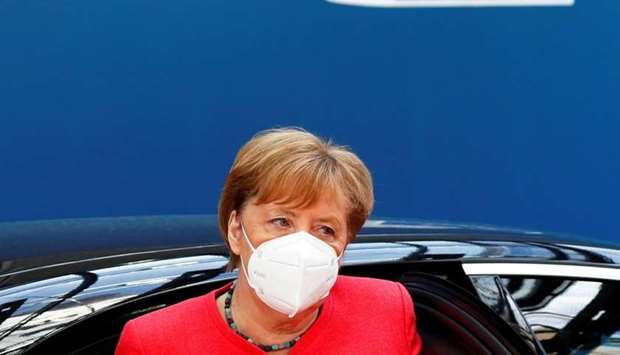The European Union moved closer to a deal on a massive economic stimulus package after four holdouts indicated they were ready to compromise on a key provision, officials said.
After negotiating through the night, the Netherlands, Austria, Denmark and Sweden are satisfied with €390bn ($450bn) of the fund being made available as grants with the rest coming as low-interest loans, the officials said, asking not be named discussing private conversations.
The total size of the recovery package is in flux, but an earlier proposal was for €750bn.
The bloc’s 27 leaders were scheduled to gather again later Monday.
in Brussels to settle the outstanding issues such as the overall size of the fund and the mechanisms for controlling its spending.
A French official said that their delegation now see a path to a full deal.
“After lengthy talks last night, we worked out a framework for a possible agreement,” German Chancellor Angela Merkel said on Monday. “It’s progress and gives hope that perhaps today an agreement will be made, or at least that an agreement is possible.”
The progress boosted markets, with the euro rising to a four-month high.
Italy’s 10-year bond yield spread over Germany, a key gauge of risk in the region, fell to the lowest level since March.
The proposal under discussion earmarks a third of the recovery fund and the next budget – more than half a trillion euros – for projects that contribute to fighting climate change.
On top of that, any expenditure that’s not consistent with the goal of reducing greenhouse gases will not be approved, making it the greenest stimulus the world has seen.
That would help Europe reach its 2050 climate-neutrality target and also could convince the fiscal hawks, which support stepping up efforts to reduce greenhouse gases, to endorse the deal.
French President Emmanuel Macron expressed cautious optimism that EU leaders would seal a recovery deal later on Monday, saying progress had been made in bridging key differences.
“There is a spirit of compromise that is there,” Macron told reporters as he arrived on the fourth day of the EU summit. “There were tense moments.
There will no doubt still be moments that are difficult.
But on this issue matters have advanced.”
Macron warned that any EU failure to reach an agreement would end up costing the bloc more and vowed to keep working closely with Merkel on a successful outcome.
With investors already pricing in an agreement after a series of bold announcements in recent weeks, leaders are under intense pressure to bridge their differences.
At times the discussions grew heated, with several officials saying the whole negotiation was on the brink of collapse during Sunday’s dinner session as familiar fault lines emerged between the richer northern nations and the southern countries worst affected by the coronavirus.
Dutch Prime Minister Mark Rutte and his allies have been trying to water down the handouts that the highly indebted southern countries see as critical for shoring up their finances – the European Commission’s initial proposal included €500bn of grants.
Yet for all the frustration facing Rutte from the other side of the table, his opponents can’t afford to push him too far.
The Dutch prime minister has just 75 deputies in his country’s 150-seat parliament so he’ll need opposition support to ratify any deal he strikes with the bloc.
“It didn’t look good at a couple of moments tonight but taking everything together, I believe progress has been made,” Rutte said.
“We are willing to make the shift from loans to subsidies if reforms are taking place and if these reforms can be enforced,” he added. “There is a very good text on this now and my impression is that it has consensus support.”
When the leaders gather this afternoon, they’ll still have to overcome two contentious issues: how to make sure the funding is properly used and whether to make distributions contingent on the adherence to democratic standards.
The new proposal from the EU, which is expected before the leaders reconvene, may remove a provision that would allow member states to hold up funding if countries don’t respect the rule of law, officials said.
It may also get rid of a plan to give enhanced power to the court of auditors, which reports on good governance transgressions.

